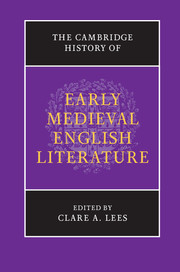Book contents
- Frontmatter
- Contents
- List of Illustrations
- List of Contributors
- Acknowledgements
- List of Abbreviations
- Introduction: literature in Britain and Ireland to 1150
- I WORD, SCRIPT AND IMAGE
- II EARLY ENGLISH LITERATURE
- 7 Across borders: Anglo-Saxon England and the Germanic world
- 8 English literature in the ninth century
- 9 The writing of history in the early Middle Ages: the Anglo-Saxon Chronicle in context
- 10 The literary languages of Old English: words, styles, voices
- 11 Old English poetic form: genre, style, prosody
- 12 Beowulf: a poem in our time
- 13 Old English lyrics: a poetics of experience
- 14 Literature in pieces: female sanctity and the relics of early women’s writing
- 15 Saintly lives: friendship, kinship, gender and sexuality
- 16 Sacred history and Old English religious poetry
- 17 Performing Christianity: liturgical and devotional writing
- 18 Riddles, wonder and responsiveness in Anglo-Saxon literature
- III LATIN LEARNING AND THE LITERARY VERNACULARS
- Bibliography
- Index of manuscripts
- Index
11 - Old English poetic form: genre, style, prosody
from II - EARLY ENGLISH LITERATURE
Published online by Cambridge University Press: 05 February 2013
- Frontmatter
- Contents
- List of Illustrations
- List of Contributors
- Acknowledgements
- List of Abbreviations
- Introduction: literature in Britain and Ireland to 1150
- I WORD, SCRIPT AND IMAGE
- II EARLY ENGLISH LITERATURE
- 7 Across borders: Anglo-Saxon England and the Germanic world
- 8 English literature in the ninth century
- 9 The writing of history in the early Middle Ages: the Anglo-Saxon Chronicle in context
- 10 The literary languages of Old English: words, styles, voices
- 11 Old English poetic form: genre, style, prosody
- 12 Beowulf: a poem in our time
- 13 Old English lyrics: a poetics of experience
- 14 Literature in pieces: female sanctity and the relics of early women’s writing
- 15 Saintly lives: friendship, kinship, gender and sexuality
- 16 Sacred history and Old English religious poetry
- 17 Performing Christianity: liturgical and devotional writing
- 18 Riddles, wonder and responsiveness in Anglo-Saxon literature
- III LATIN LEARNING AND THE LITERARY VERNACULARS
- Bibliography
- Index of manuscripts
- Index
Summary
This chapter considers the genre, style and prosody of Old English poetry, often in association with cultural history. In our willingness to examine formal features of Anglo-Saxon verse compositions in their contexts, we may bear in mind that we have access to only a fraction of this poetic tradition, and that many of the practices of vernacular poetry in early medieval England have been lost irretrievably. Gone is the feast, for example, attended by Cædmon and his secular fellows in the late seventh century. And so are songs of Ingeld and other such heroes heard at the dinner table of a certain bishop in the late eighth century, poems heard by Alfred in his youth at the royal court of Wessex and, were we to trust the ingenious William of Malmesbury, the songs sung by Harold’s men the night before the Battle of Hastings.
The only way for us to approach the culture of Anglo-Saxon verse is through the manuscripts, and the greater part of the extant poetic corpus is recorded in four codices produced in the second half of the tenth century and the early eleventh: the Junius Manuscript or Junius 11 (Oxford, Bodleian Library, MS Junius 11, s. x/xi, xi1), the Vercelli Book (Vercelli, Biblioteca Capitolare CXVII, s. x2), the Exeter Book (Exeter Cathedral, MS 3501, s. x2) and the Beowulf Manuscript (London, British Library, MS Cotton Vitellius A. xv, s. x/xi). While various attempts have been made to narrow down the dates of production for these four manuscripts, they still fall in the period of the monastic reform and the golden age of vernacular literature in late Anglo-Saxon England. The places of production for the four poetic codices cannot be determined with certainty, but they are generally associated with southern parts of England. The dialectal form of the poems recorded in these manuscripts is predominantly late West Saxon, although they tend to have a greater proportion of non-West Saxon spellings (usually labelled as Anglian or Kentish) than do prose texts produced in comparable settings. The dialectal indeterminacy of poems recorded in the major poetic codices has been interpreted as evidence for either their northern origins or the existence of a general poetic dialect – archaic and artificial – cultivated by and for the Anglo-Saxon poets.
- Type
- Chapter
- Information
- The Cambridge History of Early Medieval English Literature , pp. 278 - 308Publisher: Cambridge University PressPrint publication year: 2012
- 1
- Cited by

